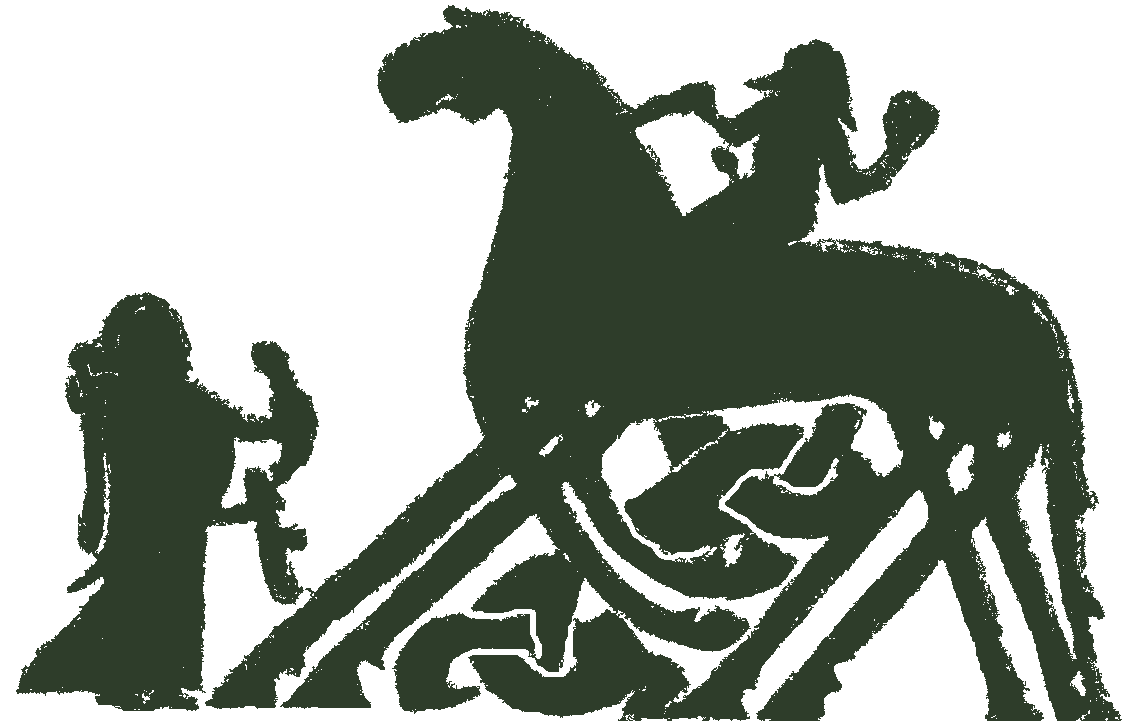in progress
King Ingi is driven from Sweden by the people when he orders the land to become Christian. He is replaced by Blót-Sveinn, who sacrifices a horse, re-introduces the blót and rejects the Christian faith.
text
[excerpt from] Heiðr ch. 16b
16b. [ Frá Inga konungi Steinkelssyni]
Hann eyddi blótum í Svíþjóð ok bað fólk allt þar kristnast, en Svíar höfðu of mikinn átrúnað á heiðnum goðum ok heldu fornum siðum. Ingi konungr gekk at eiga konu þá, er Mær hét. Bróðir hennar hét Sveinn. Inga konungi þokknaðist enginn maðr svá vel, ok varð hann í Svíþjóð inn ríkasti maðr. Svíum þótti Ingi konungr brjóta forn landslög á sér, er hann vandaði um þá hluti, er Steinkell hafði standa látit. Á þingi nokkuru, er Svíar áttu við Inga konung, gerðu þeir honum tvá kosti, hvárt hann vildi heldr halda við þá forn lög eða láta af konungdómi. Þá mælti Ingi konungr ok kveðst eigi mundu kasta þeiri trú, sem rétt væri. Þá æptu Svíar ok þröngdu honum með grjóti ok ráku hann af lögþinginu. Sveinn, mágr konungs, var eptir á þinginu. Hann bauð Svíum at efla blót fyrir þeim, ef þeir gæfi honum konungdóm. Því játa þeir allir; var Sveinn þá til konungs tekinn yfir alla Svíþjóð. Þá var fram leitt hross eitt á þingit ok höggvit í sundr ok skipt til áts, en roðit blóðinu blóttré. Köstuðu þá allir Svíar kristni, ok hófust blót, en þeir ráku Inga konung á brott, ok fór hann í vestra Gautland. Blót-Sveinn var þrjá vetr konungr yfir Svíum. | He put down sacrificing in Sweden and ordered all the people of the land to become Christian; but the Swedes had too strong a belief in the heathen gods and held to their ancient ways. King Ingi's wife was a woman called Mær; her brother's name was Sveinn. No man was more dear to King Ingi than he, and Sveinn became thereby the mightiest man in Sweden. But the Swedes thought that King Ingi had infringed their rights under the ancient law of the land, when he found fault with many things that Steinkell his father had let be; and at a certain assembly which the Swedes held with King Ingi they gave him the choice of two things, either to observe the ancient laws or else to give up his throne. Then King Ingi spoke, and said that he would not leave the true faith; whereat the Swedes cried out, and pelted him with stones, and drove him from the law-assembly. Sveinn, the king's kinsman, remained behind at that assembly, and he offered to make sacrifice for the Swedes if they would grant him the kingdom; all agreed to Sveinn's offer, and he was accepted as king over all the Swedish realm. Then a horse was led forth to the assembly, hewn in pieces, and divided up for eating, and the sacrificial tree was reddened with its blood. Thereafter all the Swedes cast off the Christian faith, and sacrifices were instituted, and they drove King Ingi away; he departed into western Gautland. For three years Sveinn the Sacrificer was king over the Swedes. |
[status: referenced copy]
commentary
context
The episode is part the legendary saga Hervarar saga ok Heiðreks
commentary
This extract suggests a legal dimension to religious tension in conversion-period Sweden. Ingi’s forced conversion is viewed as an ‘order’ (hann...bað folk) and considered in a legal context as an infringement on people’s rights under the ‘ancient law of the land’ (Svíum þótti Ingi konungr brjóta forn landslög á sér). 'Belief' (átrúnaðr) in 'heathen gods' (á heiðnum goðum) are equated with forn siðr ('ancient ways') and forn landslög ('ancient law of the land'). Like Ari's account in Íslendingabók, here religious dispute is settled by means of assembly.
In Óláfs Saga Helga (ch. 77), Snorri states that it was an old custom in Sweden, during heathen times, to hold the principal sacrifice at Uppsala in the month of gói (mid-February to mid-March). Snorri states that at that time of year the lögþing (legislative and judicial courts) were held, with people coming to it from every part of Sweden. To this occasion, no doubt, the present passage refers.
The animal (which is then hewn or cut up), blood and tree are common ingredients in the ritual practice described in literary sources as blót or ‘sacrifice’. Horses are frequently mentioned as an important sacrificial animal for pre-Christian Germanic peoples. Horse sacrifice is mentioned, for instance, in Thietmar of Merseburg's account of the great January sacrifice at Lejre in Zealand.
The 'sacred tree' of Uppsala is described in a scholion (134) to Adam of Bremen's twelfth-century history of the bishops of Hamburg: prope templum est arbor maxima late ramos extendens, aestate et hyeme semper virens: cuius illa generis sit nemo scit, and beside it, according to the scholiast, was a well where human sacrifices were drowned. All this bears a close resemblance to what is said of the ‘world tree’, Yggdrasil, in the Eddaic poems Völuspá (19) and Fjölsvinssmál (19-20).
(Contributed by Anna Millward.)
tags
Main text: Hervarar saga ok Heiðreks
Attributes: tree Sacrifice Blót Horse Blood Christianity Forn siðr
Named things: Ingi Blót-Sveinn, Swed. king
Text sections: Anon Heiðr 16bVIII
